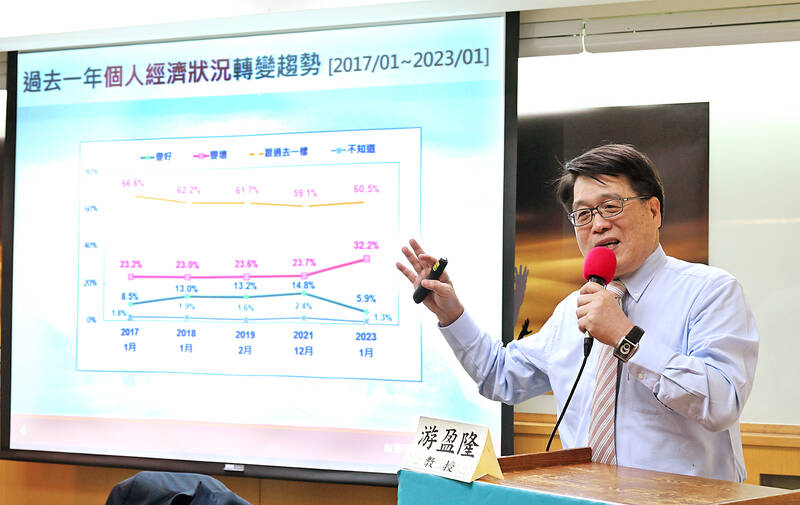It would be a tight contest between Vice President William Lai (賴清德), New Taipei City Mayor Hou You-yi (侯友宜) and former Taipei mayor Ko Wen-je (柯文哲) if next year’s presidential election involved the three potential candidates, a public opinion poll released yesterday said.
Lai, Hou and Ko received 34 percent, 31.4 percent and 22.3 percent support respectively in the poll, the Taiwan Public Opinion Foundation told a news conference in Taipei.
The foundation’s poll for this month found that 36.7 percent of respondents backed Hou to run for the Chinese Nationalist Party (KMT), while 28.6 percent supported Hon Hai Precision Industry Co (鴻海精密) founder Terry Gou (郭台銘), 7.9 percent supported KMT Chairman Eric Chu (朱立倫), 4 percent supported Broadcasting Corp of China (中國廣播) chairman Jaw Shaw-kang (趙少康) and 22.8 percent said they did not know.

Photo: Liao Chen-hui, Taipei Times
Of the respondents, 57.7 percent supported Lai, who is chairman of the Democratic Progressive Party (DPP), in the presidential election, while 16.7 percent picked former vice president Chen Chien-jen (陳建仁) to represent the party, 5.9 percent chose Premier Su Tseng-chang (蘇貞昌) and 19.8 percent said they did not know.
Compared with the foundation’s poll last month, Hou’s support rating dropped 7.3 percentage points, Lai’s increased 5 percentage points and Ko’s rose 4.5 percentage points.
Hou’s declining support shows that people are becoming aware that he has a limited say in national affairs in his current role, foundation chairman Michael You (游盈隆) said, adding that Lai’s support increased because his bid to become DPP chairman made him the focus of the recent news cycle.
In terms of party support, 26.1 percent backed the DPP, 21.5 percent chose the KMT and 20.3 percent supported the Taiwan People’s Party, while the New Power Party and the Taiwan Statebuilding Party each received the backing of 4.3 percent, the poll showed.
Of the remainder, 1.2 percent supported other political parties, 21.3 percent said they do not support any party and 1 percent said they did not know who to choose.
The poll found that 49.5 percent were dissatisfied with President Tsai Ing-wen’s (蔡英文) cross-strait policies, 38.5 percent were satisfied, 9.8 percent had no opinion and 2.2 percent said they did not know.
Seventy-two percent supported extending mandatory military service to one year, 17.3 percent opposed the policy, 7.9 percent did not have an opinion and 2.1 percent said they did not know.
Fifty-seven percent were dissatisfied with the performance of Su’s Cabinet, 35.8 percent approved of it, 5.4 percent had no opinion and 1.8 percent did not know.
Regarding the Taiwan-friendly portions of the US National Defense Authorization Act for Fiscal Year 2023 passed last month, 59.1 percent said they welcomed military assistance from Washington, while 28.4 percent did not, 7.8 percent had no opinion and 4.8 percent did not know.
Asked whether US military aid would push Taiwan into a war, 53.4 percent disagreed, 38.1 percent agreed, 5.5 percent did not have an opinion and 3 percent did not know.
The poll was conducted from Monday to Wednesday last week by calling landline telephones, and targeted adults aged 20 or older. The poll had a valid sample of 1,085 and a margin of error of 2.98 percentage points.

US President Donald Trump yesterday announced sweeping "reciprocal tariffs" on US trading partners, including a 32 percent tax on goods from Taiwan that is set to take effect on Wednesday. At a Rose Garden event, Trump declared a 10 percent baseline tax on imports from all countries, with the White House saying it would take effect on Saturday. Countries with larger trade surpluses with the US would face higher duties beginning on Wednesday, including Taiwan (32 percent), China (34 percent), Japan (24 percent), South Korea (25 percent), Vietnam (46 percent) and Thailand (36 percent). Canada and Mexico, the two largest US trading

AIR SUPPORT: The Ministry of National Defense thanked the US for the delivery, adding that it was an indicator of the White House’s commitment to the Taiwan Relations Act Deputy Minister of National Defense Po Horng-huei (柏鴻輝) and Representative to the US Alexander Yui on Friday attended a delivery ceremony for the first of Taiwan’s long-awaited 66 F-16C/D Block 70 jets at a Lockheed Martin Corp factory in Greenville, South Carolina. “We are so proud to be the global home of the F-16 and to support Taiwan’s air defense capabilities,” US Representative William Timmons wrote on X, alongside a photograph of Taiwanese and US officials at the event. The F-16C/D Block 70 jets Taiwan ordered have the same capabilities as aircraft that had been upgraded to F-16Vs. The batch of Lockheed Martin

China's military today said it began joint army, navy and rocket force exercises around Taiwan to "serve as a stern warning and powerful deterrent against Taiwanese independence," calling President William Lai (賴清德) a "parasite." The exercises come after Lai called Beijing a "foreign hostile force" last month. More than 10 Chinese military ships approached close to Taiwan's 24 nautical mile (44.4km) contiguous zone this morning and Taiwan sent its own warships to respond, two senior Taiwanese officials said. Taiwan has not yet detected any live fire by the Chinese military so far, one of the officials said. The drills took place after US Secretary

THUGGISH BEHAVIOR: Encouraging people to report independence supporters is another intimidation tactic that threatens cross-strait peace, the state department said China setting up an online system for reporting “Taiwanese independence” advocates is an “irresponsible and reprehensible” act, a US government spokesperson said on Friday. “China’s call for private individuals to report on alleged ‘persecution or suppression’ by supposed ‘Taiwan independence henchmen and accomplices’ is irresponsible and reprehensible,” an unnamed US Department of State spokesperson told the Central News Agency in an e-mail. The move is part of Beijing’s “intimidation campaign” against Taiwan and its supporters, and is “threatening free speech around the world, destabilizing the Indo-Pacific region, and deliberately eroding the cross-strait status quo,” the spokesperson said. The Chinese Communist Party’s “threats